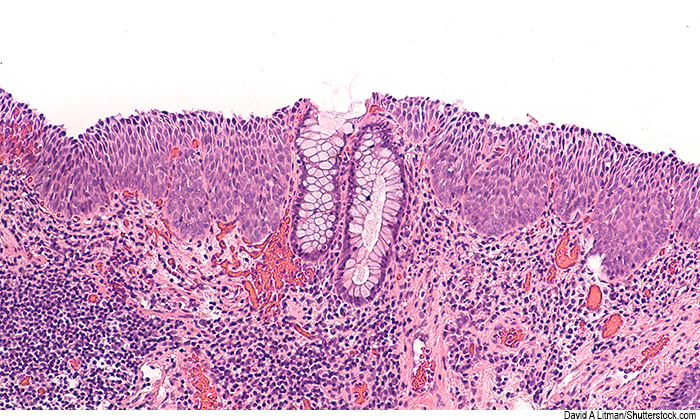Study Finds Treating Precancerous Growths in People with HIV Reduces Anal Cancer by More Than Half
July 14, 2022

Like cervical cancer, anal cancer is caused by human papillomavirus (HPV), leading to precancerous high-grade squamous intraepithelial lesions that can progress to cancer.
“Treatment of high-grade cervical lesions is known to prevent cervical cancer in women,” notes Dr. Hagensee. “Anal cancer has Increased 25-fold in persons living with HIV, and the ANCHOR study is based on the same approach.”The ANCHOR (Anal Cancer-HSIL Outcomes Research) trial enrolled more than 4,000 people living with HIV who had high-grade anal lesions on biopsy at 25 sites in the US.
“We screened over 300 people at University Medical Center and followed 100 with high-grade lesions,” says Dr. Hagensee, who sees patients at UMC, a major LSU Health New Orleans teaching hospital.Participants were randomly assigned to a treatment group or a group who were closely observed, the current standard of care. Those in the treatment group underwent procedures to remove the lesions -- office-based ablative procedures, ablation or excision under anesthesia -- or the administration of topical fluorouracil or imiquimod. Treatment reduced anal cancer by 57%.
Although anal cancer is rare in the general population, with 9,440 new cases estimated in 2022, the incidence has been increasing in the US. The highest risk is for persons living with HIV.“Our results support the use of screening and treatment for anal HSIL as the standard of care for persons living with HIV,” Dr. Hagensee concludes. “Next steps include determining the best way to screen persons living with HIV for detecting high-grade lesions, when should this screening start and at what intervals, and what is the best way to treat someone with high-grade anal lesions.”
The research was supported by the National Cancer Institute of the National Institutes of Health.______________________________________________________________________________________________________________ LSU Health Sciences Center New Orleans (LSU Health New Orleans) educates Louisiana's health care professionals. The state's health sciences university leader, LSU Health New Orleans includes a School of Medicine with branch campuses in Baton Rouge and Lafayette, the state's only School of Dentistry, Louisiana's only public School of Public Health, and Schools of Allied Health Professions, Nursing, and Graduate Studies. LSU Health New Orleans faculty take care of patients in public and private hospitals and clinics throughout the region. In the vanguard of biosciences research, the LSU Health New Orleans research enterprise generates jobs and enormous annual economic impact. LSU Health New Orleans faculty have made lifesaving discoveries and continue to work to prevent, advance treatment or cure disease. To learn more, visit http://www.lsuhsc.edu, http://www.twitter.com/LSUHealthNO, or http://www.facebook.com/LSUHSC.
